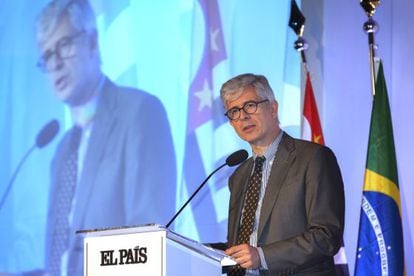EL PAÍS launches Brazilian website
New edition is “a very big step for our country,” says President Rousseff Cebrián: “There is need to define Latin America’s role in the globalized era”

With the launch of a Portuguese-language internet edition on Tuesday, EL PAÍS has embarked on what is probably its biggest professional and business venture since the newspaper was founded 37 years ago. The Spanish daily has always had the vision of becoming a global newspaper, something that was proved in March when it launched an Americas edition. Now the Portuguese internet portal, EL PAÍS Brasil, broadens that scope.
“There is need to define Latin America’s role in the context of globalization,” said Juan Luis Cebrián, founder and president of EL PAÍS, in São Paulo, where the webpage was officially launched and from where its staff will operate.
According to the newspaper’s editor, Javier Moreno, EL PAÍS Brasil will defend social progress, respect for minorities, and the modernization of society — the foundations on which the newspaper was built. “Since the newspaper’s birth in 1976 there has been a legion of [Brazilian] intellectuals, writers, actors and politicians who have chosen its pages to convey their ideas, defend their projects and share their concerns with the rest of the Ibero-American world with the great potential of its two languages, Spanish and Portuguese.”
Prince Felipe, who was unable to attend the event due to a technical problem with his plane, conveyed his message through a videotaped address. “That a major daily, such as EL PAÍS, has selected Brazil as the framework for its international expansion demonstrates the commitment that [EL PAÍS’s publisher] PRISA and Spain have to Ibero-America,” the prince said.
EL PAÍS Brasil will defend social progress, respect for minorities, and the modernization of society — the foundations on which the newspaper was built
To celebrate the launch, Moreno conducted a lengthy interview on Monday with Brazilian President Dilma Rousseff, which became the first lead story on the EL PAÍS Brasil website. “I believe it is a big step for our country,” Rousseff said, before tackling national issues, including the recent spying allegations concerning the United States’ NSA agency and the wave of social protests by citizens that began in June.
“I am going to tell you: they were very embarrassed; they were very sorry but without any attitude,” said Rousseff in describing the US government’s response to Brazil’s official complaints over the National Security Agency’s alleged tapping of her telephone and monitoring of the private communications of thousands of Brazilians. The reports, which came from stolen information by wanted former NSA contractor Edward Snowden, prompted Rousseff in October to cancel what would have been her first official trip to Washington. “As a person, I don’t have what the Americans call ‘bad feelings,’ but as president I am angry; not because it was an invasion of my personal privacy, but the privacy of a president,” she said.
Touching on the protests that began in Rio and took the country by surprise when they spread to other cities, Rousseff said they were the “fruit of two processes: democratization and growth.”
“First off, we learned that when they have democracy, people always want more democracy. When they have social inclusion, they want more social inclusion. Secondly, we learned that the government has to listen to the voices in the street. A government cannot isolate itself and listen only to itself.”










































